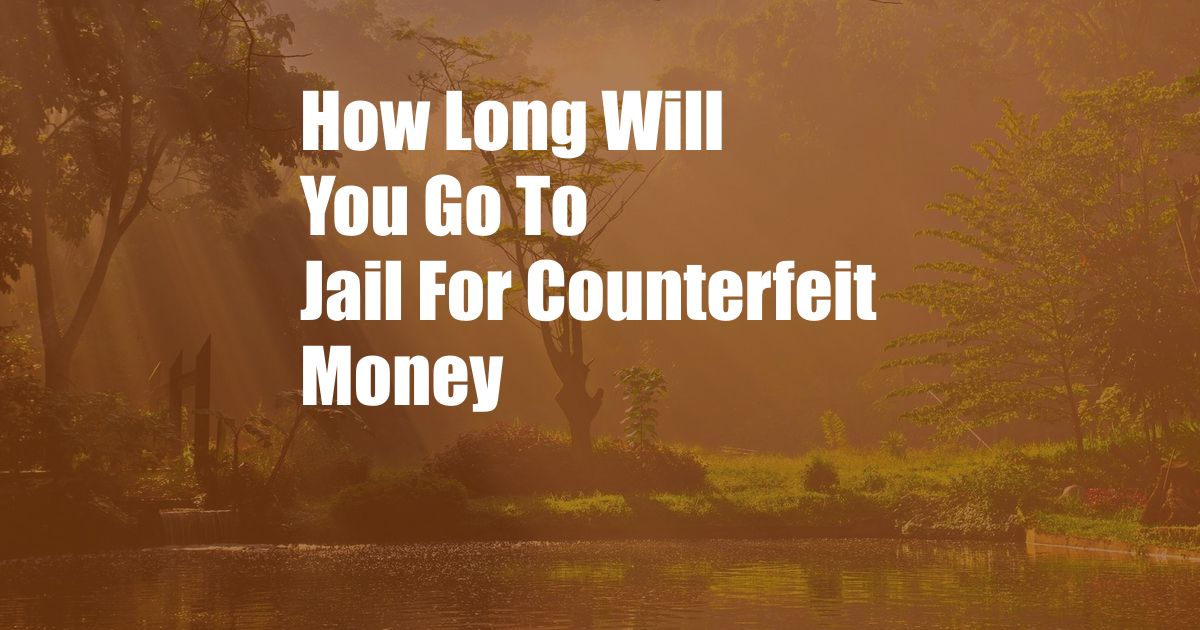
Counterfeit Money: Uncovering the Hidden Dangers and Legal Consequences
The allure of easy money can tempt the most honest individuals. However, the consequences of dealing with counterfeit currency are severe and far-reaching. I once encountered a young man who, driven by desperation, resorted to using fake bills to pay for basic necessities. Little did he know that his actions would land him behind bars, costing him not only his freedom but also his reputation and future prospects.
Counterfeiting, the illegal act of imitating or replicating currency or other official documents, is a serious crime. It undermines the trust and stability of the financial system and can have detrimental effects on individuals and society as a whole.
The Grave Penalties of Counterfeit Money
The penalties for counterfeiting vary depending on the severity of the offense and the jurisdiction in which it occurs. However, in most countries, the consequences are dire.
Federal Offenses: In the United States, counterfeiting is a federal crime punishable by up to 20 years in prison and substantial fines. The severity of the sentence depends on the amount of counterfeit currency involved, the intent behind the offense, and the defendant’s prior criminal history.
State Offenses: Many states also have their own laws against counterfeiting, which may carry additional penalties. For example, in California, counterfeiting is a felony punishable by up to 3 years in prison and a fine of up to $10,000.
Consequences Beyond Imprisonment
In addition to the potential for incarceration, counterfeiting can have a range of other negative consequences.
- Financial Loss: Counterfeit money is worthless, and those who use or possess it can lose significant sums of money.
- Criminal Record: A conviction for counterfeiting can result in a criminal record, making it difficult to obtain employment, housing, and other necessities.
- Reputation Damage: Counterfeiting is a crime of dishonesty, and can damage one’s reputation and relationships.
- Increased Surveillance: Individuals convicted of counterfeiting may be subject to increased surveillance and monitoring by law enforcement.
Prevention and Reporting Counterfeit Currency
Preventing counterfeit money from circulating is of utmost importance. The public can assist by being vigilant and reporting any suspicious bills to authorities. Here are some tips:
- Inspect banknotes carefully for any abnormalities in color, texture, or printing.
- Use counterfeit detection pens or devices to identify potential fakes.
- Report any suspected counterfeit bills to local law enforcement or the Secret Service.
By working together, we can help protect our financial system and prevent the devastating consequences of counterfeit money.
Frequently Asked Questions
Q: What is the difference between counterfeiting and forgery?
A: Counterfeiting involves making copies of currency or other official documents, while forgery involves altering or fabricating genuine documents.
Q: Can I be charged with counterfeiting if I didn’t know the money was fake?
A: In most cases, yes. Ignorance of the counterfeit nature of the money is generally not a valid defense to counterfeiting charges.
Q: What if I received counterfeit money without knowing it?
A: It is important to report any suspected counterfeit bills to authorities immediately, even if you did not knowingly obtain them.
Q: Is it legal to collect counterfeit currency?
A: No, it is illegal to possess or collect counterfeit currency, even if it is marked as “replica” or “facsimile.”
Q: What should I do if I’m caught with counterfeit money?
A: Do not attempt to use or pass the counterfeit bills. Contact law enforcement immediately and cooperate with their investigation.
Conclusion
Counterfeit money is a serious crime with severe consequences. By understanding the penalties, prevention methods, and reporting procedures, you can protect yourself and others from the dangers associated with this illegal activity.
Are you interested in learning more about the legal implications of counterfeiting and other financial crimes? Explore our website for additional resources and insights.